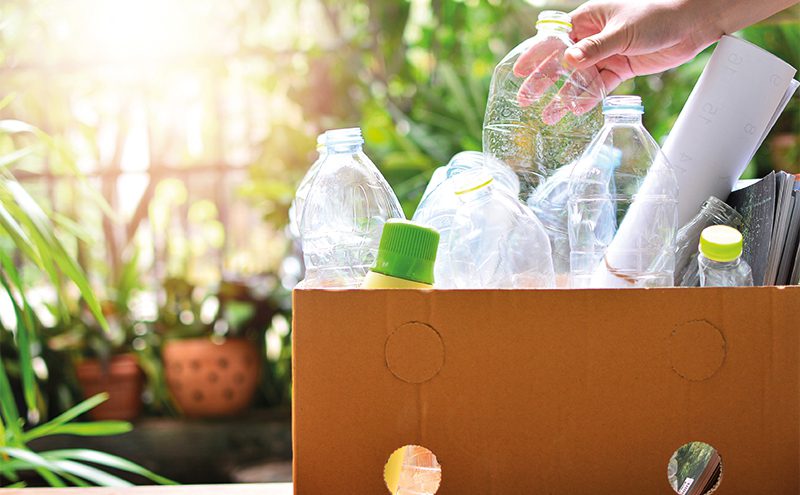Coming at the end of a year in which plastic waste has entered the public conversation like never before, the Government’s new Waste & Resource strategy for England had a lot of ground to cover to elicit a positive response from the waste industry. This it appeared to do, with a few noteable caveats
On 18 December DEFRA launched its long-awaited Resources and Waste Strategy, an ambitious policy paper outlining how England will embrace a circular economy. The document was the first such review of waste policy in 11 years.
Against a backdrop of flatlining household recycling figures in England (since 2013), and only a third of households supported by food waste collection, the strategy document put forward a number of ideas to help take back the initiative. These included measures to make products more recyclable, such as extensions to existing producer responsibility schemes.
Clarifying the context behind the announcement, Jochen Behr, Head of Recycling at paper recycler DS Smith commented: “A year on from Blue Planet Two, it is disappointing that we continue to produce household waste faster than we can recycle it. 2018 has been a turbulent year for recycling as now, for the first time, we are set to incinerate more than we recycle.”
As Behr suggested, stagnating recycling rates demand a bold new approach, so he welcomed the apparent commitment to overhauling England’s waste system and taking steps towards building a circular economy. However, he said, “the public remains confused by the UK’s 150 or more different household waste collection methods.” The strategy included signs of a renewed effort to ensure consistency of collection across England, and measures such as clearer labelling on packaging to help consumers put the right stuff in the right bin.
Other measures to be introduced include compulsory electronic tracking of waste, to try and crack down on waste crime. However, Simon Ellin of the Recycling Association said “we need to ensure [this] doesn’t create onerous bureaucracy” for recycling firms.
The November budget pledge to increase the amount of recycled content in packaging – to a minimum of 30% by 2022, or else a tax will apply – was confirmed in this new document. Vanden UK managing director David Wilson welcomed this but still had problems with the wording, adding that “we need to define what exactly is recycled content first.” He went on: “For example, will recycled content be defined purely from the amount of post-consumer waste it contains, or will post-production scrap that has been reintegrated into the manufacturing process be considered recycled content? We have asked this question of government agencies and nobody seems to know the answer at present.”
While the RA’s Simon Ellin has also been approving of this tax on plastic packaging that does not meet a minimum level of 30% recycled content, he added that the strategy “does not mention how investment will be generated for new UK recycling capacity to provide that recycled content. We hope the consultation on this will address this omission. It also needs to look at how improvements can be made to the planning system to make it easier to set up new recycling capacity in the UK.”
While stimulating the demand for recycled plastics seems a virtuous aim, some recycled plastics are already in higher demand than virgin material, as Wilson pointed out. For example, recycled PET, which currently commands a premium price over virgin because some manufacturers have already taken the step of ensuring there is more recycled content in their packaging – for moral reasons or to meet a demand from their customers. As Wilson said, “often these [products] are already using more than 30% recycled content anyway and therefore need more supply of material, requiring more investment in recycling capacity.”
Ahmed Detta, founder of a start-up firm in the area of plastic packaging recycling, Advanced Sustainable Developments (ASD), was more pointedly critical of the strategy, declaring the UK’s recycling industry to be “inherently broken” and decrying a shortfall of boldness and transparency in this latest document. In particular the Government “needs to go further and address the poor skill set in the industry”, he said.
“Councils simply do not have the technical skill set inhouse to deliver solutions to our recycling problems. The problem with PET plastic (the most ubiquitous of the seven plastics recycled in the UK) needs to be central to our recycling strategy in the UK and Government must support innovation and introduce new technology.” His own firm has a focus on PET and circular economy thinking.
The strategy advanced proposals to help move the financial burden of recycling onto the shoulders of the producers and manufacturers, with the document stating that businesses and manufacturers will pay “the full cost” of recycling or disposing of their packaging waste – up from its current level of 10%. In practice this will operate via a modulated fee to ensure that those who produce packaging that is very difficult or impossible to recycle will pay the most.
The Government expects Extended Producer Responsibility to help raise the funds to pay for recycling and some of the new measures outlined in the strategy. EPR for packaging, for example, is expected to raise between £0.5 billion and £1 billion per year.
The document also promises to introduce a deposit return scheme, subject to consultation, to increase the recycling of single-use drinks containers including bottles, cans, and disposable cups filled at the point of sale.
One area seemingly long overdue for attention was food waste, with only a third of households in England currently supported by regular food waste collection. The strategy appeared very positive in this respect, with a declared commitment to zero-food-waste-to-landfill and mandatory weekly collections of food waste. However, with so many of these measures subject to “consultation” there seemed room for scepticism.
As ReFood’s Philip Simpson put it: “In my experience, this means delays, doubt and the ability to back-track. Even if the consultation is successful, legislation wouldn’t come into force until at least 2023 – more than four years away. There is also no mention of cost to the householder, details of how such a scheme would operate or the national uniformity of collections. Surely all instrumental questions if we are truly serious on banning food waste to landfill?”








